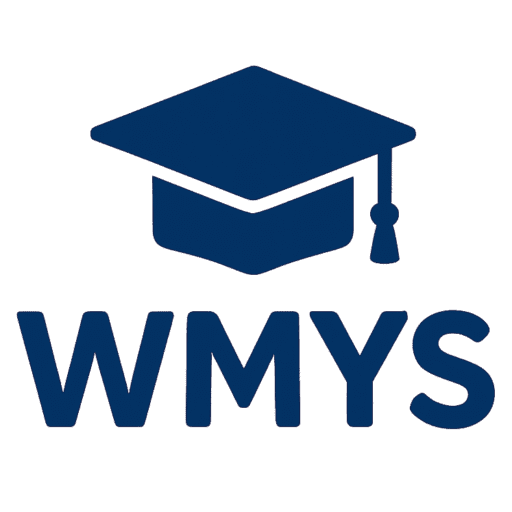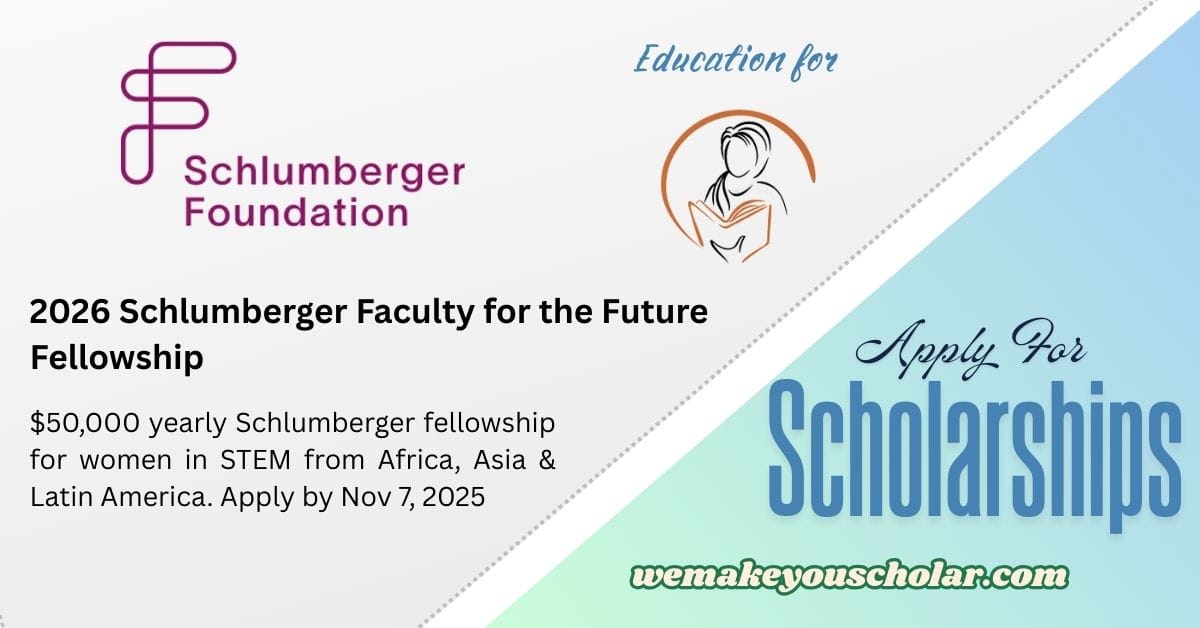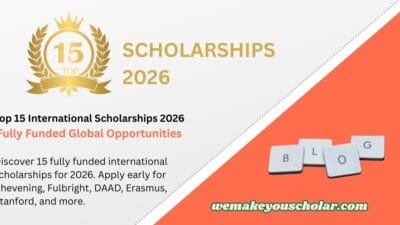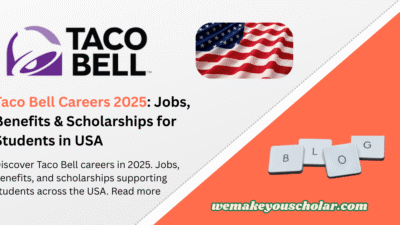Faculty for the Future Fellowship 2026: $50,000 Annual Award for Women in STEM from Africa, Asia, and Latin America
Across the globe, the gender gap in Science, Technology, Engineering, and Mathematics (STEM) is narrowing, but the progress is uneven. In wealthy countries, women are gaining ground, yet in Africa, Asia, and Latin America, the picture is more complicated. Talented women often face limited opportunities, cultural stereotypes, or financial barriers that make pursuing advanced research nearly impossible.
The Schlumberger Foundation Faculty for the Future Fellowship was designed to change that reality. Since its launch in 2004, this program has been one of the few major international fellowships focused specifically on supporting women from developing and emerging economies. Each year, the foundation invests in women who want to complete PhD or post-doctoral research in STEM at leading universities around the world.
For 2026, applications open on September 1, 2025, and close on November 7, 2025 (12:00 noon CST). Reference letters are due by November 14, 2025. Successful applicants could receive up to $50,000 per year, renewable until the completion of their program.
About the Faculty for the Future Fellowship
The fellowship was established by the Schlumberger Foundation, a nonprofit organization that has long supported scientific and educational initiatives. The guiding principle is simple: women in developing regions deserve the same access to advanced research opportunities as their peers in developed countries.
Unlike general scholarships, this fellowship has two distinct goals:
Provide financial support for women in STEM fields who are pursuing advanced studies abroad.
Encourage return and reinvestment—recipients are expected to bring their knowledge back to their home countries and apply it through teaching, research, or leadership.
Since its beginning, more than 860 women from over 90 countries have received this fellowship. Many have gone on to establish research centers, teach at universities, or become advisors to governments and NGOs.
Who Can Apply?
The eligibility criteria for the 2026 Faculty for the Future Fellowship are strict but straightforward. Applicants must:
Be female citizens of a developing or emerging economy (African, Asian, and Latin American countries are all included).
Not hold dual citizenship with a developed country.
Be preparing for or enrolled in a PhD or post-doctoral program in a STEM discipline. Master’s degrees are not funded.
Be admitted to or applying to a host university or research institute abroad.
Show an outstanding academic record.
Commit to returning home after completion to contribute to local STEM development.
Demonstrate leadership skills and evidence of mentoring or advocating for women in STEM.
This final requirement is particularly important. The fellowship isn’t just about creating scientists—it’s about creating role models who inspire others.
Fellowship Benefits
The Faculty for the Future Fellowship offers generous support:
PhD Fellows: Up to $50,000 per year.
Post-doctoral Fellows: Up to $40,000 per year.
Renewal: Funding is renewable annually until completion, provided academic progress is satisfactory.
Flexibility: Covers tuition, living costs, research-related expenses, and travel.
Networking: Fellows gain access to a global network of women in STEM, sharing experiences and creating collaborations.
Regional Importance: Why Africa, Asia, and Latin America
1. Africa
In many African nations, women in STEM face hurdles beyond financial limitations. The fellowship supports African women with the more chances to study at globally recognized institutions and then return to lead programs in universities such as the University of Lagos, Makerere University, or University of Cape Town. Past fellows from Africa have gone on to establish new departments, secure international grants, and launch science-based businesses.
2. Asia
In countries like India, Pakistan, Bangladesh, and Nepal, the percentage of women in senior research positions is very low. Such fellowship strengthens the region’s human capital in critical areas like renewable energy, biotechnology, and artificial intelligence.
3. Latin America
Gender disparities persist in STEM. Countries like Brazil, Mexico, and Colombia produce excellent scientists, however many women are unable to pursue advanced research mainly due to funding shortages. Fellows from Latin America also often work on issues such as climate change adaptation, public health, and sustainable agriculture.
Application Timeline
Opening Date: September 1, 2025
Closing Date: November 7, 2025 (12:00 noon CST)
Deadline for Reference Letters: November 14, 2025
Notification: Selected fellows will be contacted in early 2026
Step-by-Step Application Process
Eligibility Check
Review criteria carefully to confirm eligibility.Registration
Create an account on the Faculty for the Future online application portal.Prepare Application Materials
Curriculum Vitae (CV)
Academic transcripts
Research proposal
Proof of admission or enrollment (if available)
Two or three strong reference letters
Submit Application
Applications must be submitted by November 7, 2025.Reference Letters
Ensure referees upload their letters by November 14, 2025.Wait for Results
The review process is competitive, and results will be shared in early 2026.
Tips for a Strong Application
Tailor your research proposal to address specific challenges in your home country.
Highlight your commitment to returning home and contributing to local development.
Choose referees who can provide detailed endorsements, not just general praise.
Provide examples of your leadership and outreach efforts, such as mentoring students or leading science clubs.
Show alignment with global development goals, like the UN’s Sustainable Development Goals (SDGs).
Impact and Success Stories
Africa: A fellow from Kenya returned home to establish a new engineering curriculum at her university, training hundreds of young women in mechanical and civil engineering.
Asia: An Indian recipient used her postdoctoral training in renewable energy to influence state policy on solar energy adoption.
Latin America: A Brazilian fellow launched a STEM incubator for women entrepreneurs, bridging research and industry.
These stories illustrate how one scholarship can generate ripple effects that influence entire communities.
Frequently Asked Questions (Top 5)
1. Who is eligible to apply for the Faculty for the Future Fellowship?
You must be a woman from a developing or emerging economy, preparing for a PhD or postdoctoral study in a STEM field. Master’s programs are not covered. Applicants cannot hold dual citizenship with a developed country and must commit to returning home to contribute to STEM development.
2. How much funding does the fellowship provide?
The fellowship offers up to USD 50,000 per year for PhD students and USD 40,000 per year for postdoctoral researchers. It covers tuition, living expenses, travel, and research costs. In some cases, limited childcare support may also be available.
3. Can the fellowship be renewed?
Yes. The grant is initially awarded for one academic year and can be renewed annually, depending on academic progress, strong references (including from your host supervisor), and continued commitment to returning home after completion.
4. Do I need to secure a host university before applying?
Yes. Applicants must find their own host university and supervisor before submitting the application. There is no official list of accredited universities, but you are encouraged to apply to top institutions in your field.
5. Am I required to return to my home country after my studies?
Yes. A core condition of the fellowship is that recipients use their training to benefit their home countries. Strong evidence of plans to return—such as collaborations, outreach, or job applications—is crucial both for selection and for renewal.
Conclusion: A Fellowship That Transforms Futures
The Faculty for the Future Fellowship 2026 is more than just funding—it’s a lifeline for women who want to transform their own lives and, in turn, their communities. By targeting women from Africa, Asia, and Latin America, the program helps bridge the global gender gap in STEM.
If you are a woman from these regions with a passion for science and a commitment to making a difference at home, this is your opportunity. Applications open on September 1, 2025—don’t let the deadline pass.
Official Link: For further details, please visit the official website.
Other Scholarships:
- Fully Funded Ph.D. at Virginia Tech (USA) 2026 – $34,000
- FIFA World Cup 2026 Volunteer Opportunities in USA, Canada & Mexico
- University of Liverpool PhD 2025: Cancer Biology and Polarity Regulators in PDAC




